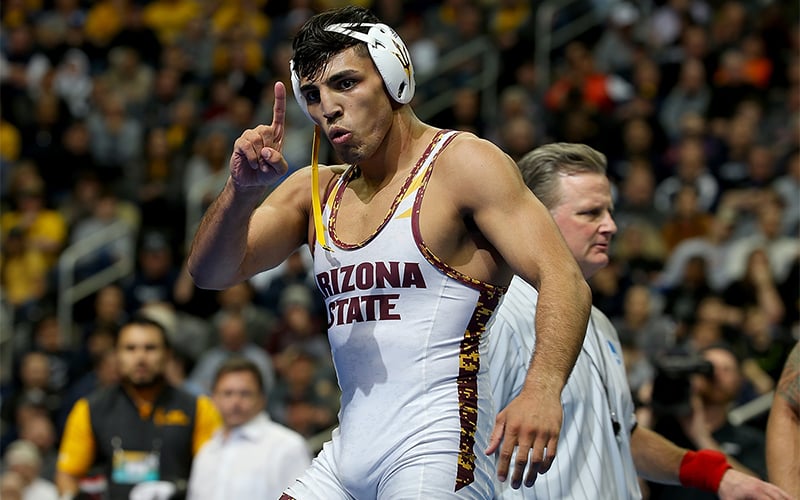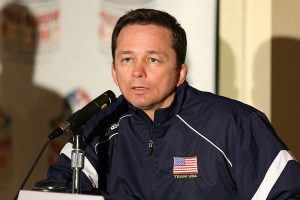
Two-time NCAA champion Zahid Valencia is one of the reasons Arizona State has been a dominant program in recent years. The Sun Devils are hoping the Pac-12 Conference can expand its pool of teams. (Photo by Justin K. Aller/NCAA Photos via Getty Images)
PHOENIX – Fearing it could lose its automatic NCAA qualifier status in wrestling, the Pac-12, which features powerhouse Arizona State, was on the hunt for an affiliate school to join the conference.
On Friday it announced it found one: University of Arkansas at Little Rock.
The league is challenged by the absence of a strong Division I wrestling presence in the western United States. Of the traditional Pac-12 schools, only three have programs: Arizona State, Stanford and Oregon State. The five-team conference is rounded out by affiliates Cal Poly and California State University, Bakersfield.
The governing body of college athletics requires a minimum of six schools in a conference for the conference champion in a weight class to automatically qualify for the NCAA Championship.
“It’s the best-kept secret in wrestling,” ASU coach Zeke Jones said. “We need this automatic qualifier, or then we go into this wildcard pool and it’s too risky, so there’s three Pac-12 schools in wrestling that get hurt by that. So where’s the protection for us three within the conference? That’s the question people ask.”
Cal Baptist in Riverside, California, is one program that some had speculated could jump to the Pac-12. Instead it found Little Rock, which will begin its inaugural season in 2019-20 after becoming one of the newest NCAA Division I wrestling programs.
Wrestling overall has seen a dip at the Division I level in recent memory. According to Forbes, as of 2016, 41 Division I wrestling programs had been cut since 1988-89.
“There are good, solid numbers here,” Jones said. “It just stops at high school. The strength is excellent but at the collegiate level, it’s nonexistent.
“That’s what the beauty of Arizona State is, that we’re a program on the West Coast where the best kids on the West Coast can come here and call it home.”
A recent Pac-12 dropout was Boise State, who cut the sport in 2017 to facilitate adding baseball. Following the Broncos’ departure, the conference was allotted a two-year grace period to add a sixth member institution.
Teresa Gould, the Pac-12’s Senior Associate Commissioner, Sports Management and Institutional Services, said the Pac-12 has pursued potential affiliates ever since.
How does the process work?
“If an affiliate member is interested in joining, it starts with the wrestling coaches (and they) have annual governance meetings and they would vote to support a potential affiliate member,” Gould said. “Then, it goes to our senior women administrators. That’s the group that oversees the sport of wrestling in the Pac-12.
“Then, it goes to our counsel and then from our council it goes to our CEO group. Essentially, a request for affiliate membership from any institution goes through our governance process. But the final decision making authority rests with our CEO Group.”
If a team had not been added, Pac-12 wrestlers would have still been postseason eligible but conference champions in each weight class would not have been guaranteed a spot at the NCAA Championship. Schools and wrestlers would be at the mercy of the NCAA committee, Jones said, and put into a pool of at-large candidates from around the country.
Jones was a member of ASU’s lone national championship wrestling team in 1988. Before returning to Tempe in 2014 to coach, he watched from afar as the athletic department briefly cut wrestling in 2008 before reinstatement courtesy of financial assistance from local civic leadership.

Arizona State wrestling coach Zeke Jones sees great benefit in Pac-12 expansion. (Photo by Imeh Akpanudosen/Getty Images)
It was only a matter of days before it returned. Jones has since elevated ASU into perhaps the premiere western wrestling program, turning out multiple All-Americans, NCAA qualifiers and a two-time national champion.
That stream of success could be hindered without the conference’s automatic NCAA qualification.
“The beauty of having six teams in the conference is you control your own destiny,” Jones said. “You win the Pac-12, you go, no matter how bad you are.”
Gould said the conference did its due diligence to make that happen. Not only did the league explore a sixth team but she said a seventh or eighth could also be in play.
“We’re committed to the sport of wrestling,” Gould said. “We know it’s critically important to all of our wrestling members and our student-athletes to retain the automatic qualification. It is of the utmost priority to us to provide that for (them). We’re currently in conversation with multiple institutions.”
Although Gould said she is not authorized to discuss specific institutions out of confidentiality, the conference has been “extremely thorough and (is) vetting any and all opportunities that might be available,” she added.
According to FloWrestling, 80 Division I wrestling programs will be eligible for the postseason by 2022 after five programs recently made the jump. While that may provide the conference with additional options moving forward, one West Coast program stands out as a potential future fit.
Cal Baptist just wrapped up its first campaign in Division I. It competes in the Western Athletic Conference and is one of only two Division I wrestling programs in California not in the Pac-12. The other is Fresno State, a 2017 addition to the Big 12.
Despite the promotion, CBU is in the midst of a four-year transition period and will not be eligible for the postseason for another three years.
“They want to make sure that you’re NCAA-compliant and obeying the rules and you have the finances and facilities,” CBU coach Lennie Zalesky said. “I think we can show we have that without waiting four years. We were very compliant in D2. It certainly hurts recruiting.
“I think we can be a Top 20 team once we’re eligible.”
Just because Cal Baptist makes sense geographically, that doesn’t necessarily dictate how the Pac-12 will evaluate potential options. Unlike college football or basketball, Pac-12 wrestling regulations do not require the schools to compete during the regular season.
Gould said the conference will explore all future avenues.
“Whether you’re one of the three primary Pac-12 members or an affiliate, there is no requirement that they compete against each other during the regular dual-meet season,” she said. “While we’re certainly looking for institutional fit and an institute that makes sense, I would not say that geography is a significant consideration because really the only requirement of these programs to compete against each other is during the conference championship. So, just that one week a year.”
The university was unwilling to discuss a potential conference shift but CBU’s athletic department provided Cronkite News with a statement that read:
“CBU is exploring ways to provide the best opportunities for our student athletes; at present, we choose not to discuss specifics.”
Despite the looming decision, Gould is confident that the league is in good hands moving forward. Priding itself on being the Conference of Champions, the Pac-12 is committed to living up to that name.
“We’re definitely at an important crossroads right now in terms of building out our membership in a way that is sustainable and viable moving forward,” she said. “But I think we have a long future from the perspective of our member institutions are very committed to the sport.
“They’re committed to being competitive in the sport and competing to win championships and bring some of the best wrestlers in the country to our campuses. So I think the future is very bright, consistent with our other national championship caliber programs across the conference.”
Follow us on Twitter.
